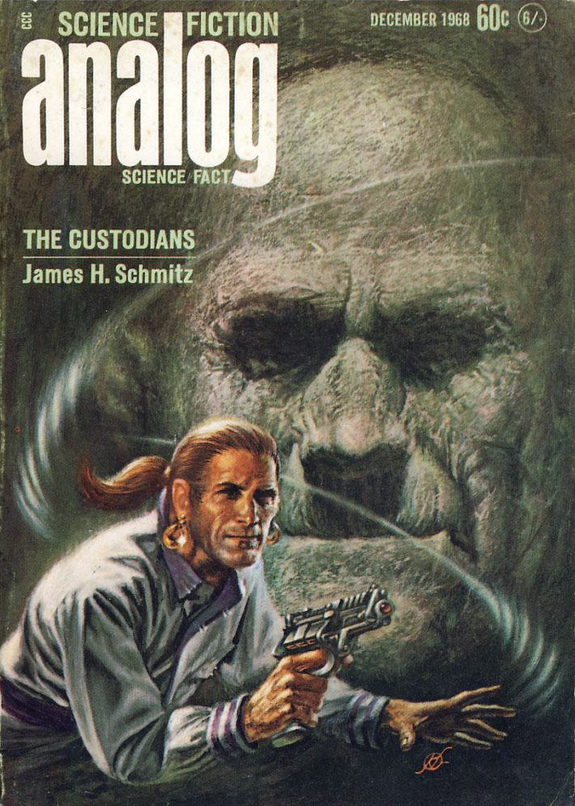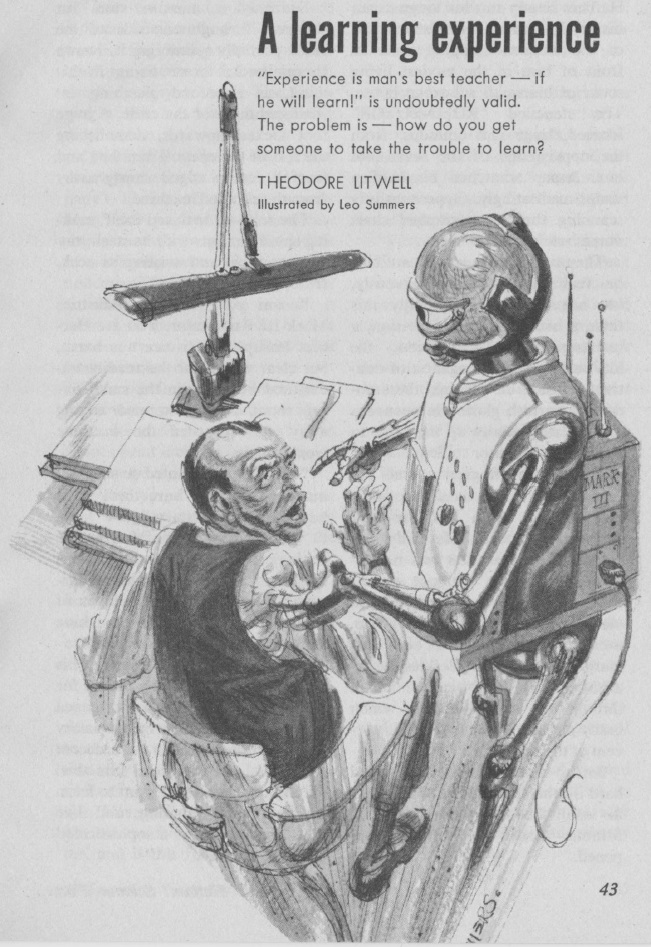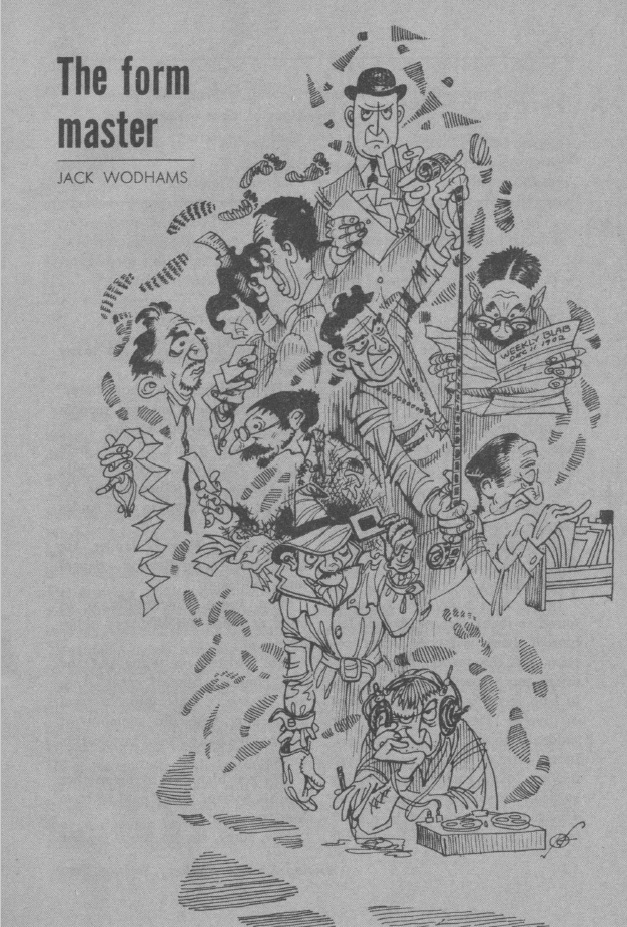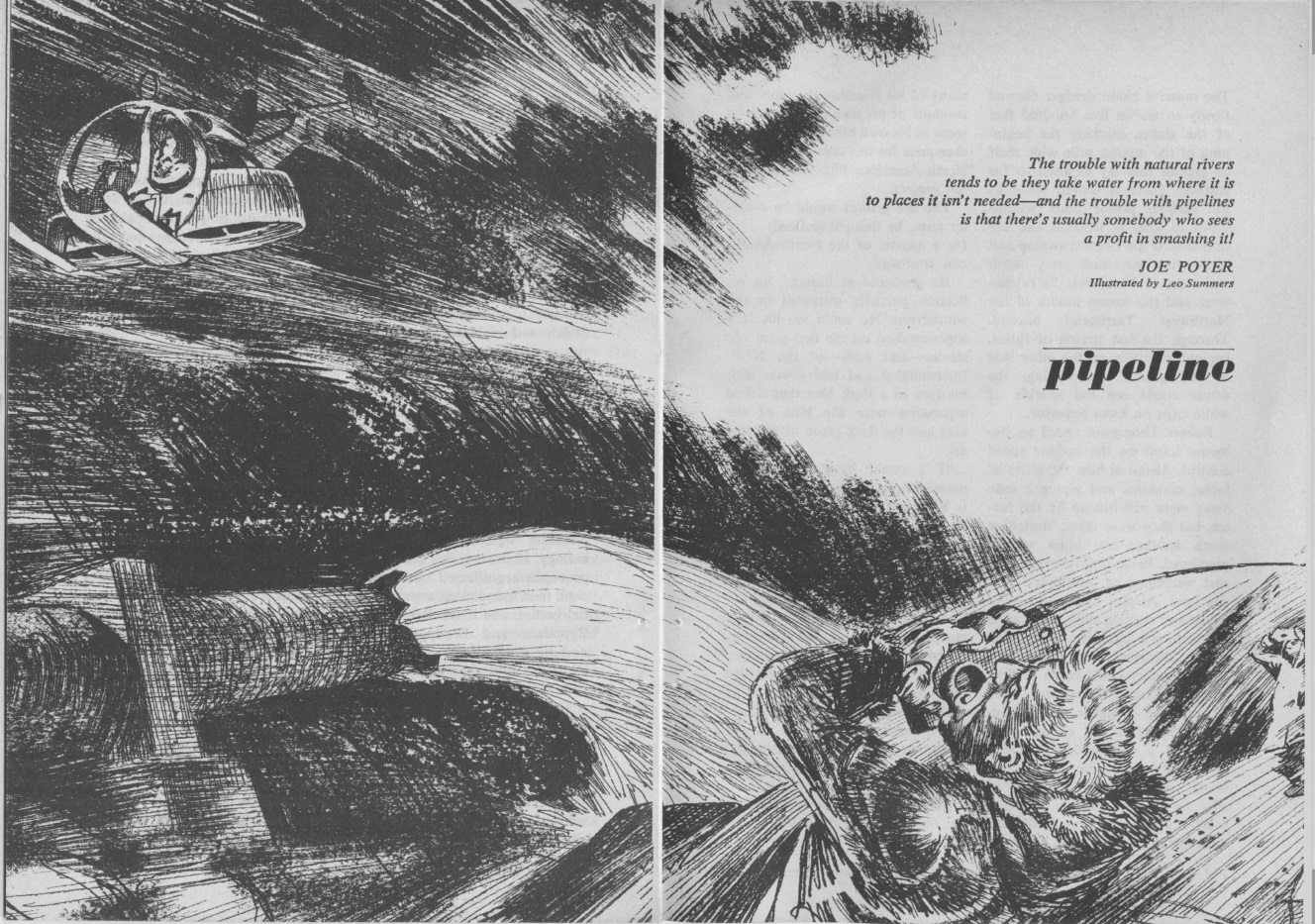
by Gideon Marcus
Once more with feeling
Less than two months ago, the Soviets sent Zond 5 on a trip around the Moon in a precursor to a manned flight. And on November 18, Zond 6 repeated the feat with, apparently, even more success. There was some suggestion that Zond 5's reentry and descent was fraught with issues. No such trouble (reported) on Zond 6.

A photo of the Earth from the vicinity of the Moon returned by Zond 6.
The USSR now says (or say, if you're British) that they might well have a manned flight to lunar orbit by early December. This is even as NASA prepares to send Apollo 8 on a circumlunar course on December 21. Yes, it sure seems like the breakneck Space Race is on again. May it claim no more lives in the process.
Once more with mild enthusiasm

by Kelly Freas
The Custodians, by James H. Schmitz
In the far future, Earth's one-world government has collapsed, leaving a plethora of princely states to war with indifferent ferocity. Further out, the settled asteroids, turned into giant space ships, placidly orbit the Sun, maintaining civilized culture as well as they can. And beyond lie the alien-settled "out planets".
After an unprofitable eight-year cruise, Jake Hiskey, commander of the Prideful Sue, has a jackpot plan. He is smuggling in a ship of Rilfs—humanoids with a deadly, natural weapon that kills all animals within a twenty-mile radiius—to serve as mercenaries on Earth. But to get them to Terra, he must first stage on an asteroid. The obvious choice is the one that the sister of Harold, the Sue's navigator, calls home.
The catch: the Rilf who goes by the name McNulty insists that no one know that the Rilfs are on the asteroid. That means all potential witnesses must be eliminated. This includes all of the asteroid's residents and, by extension, Harold, since he is afflicted with a conscience.
Well, Harold is no fool, and he susses out the plan just at its moment of murderous implementation. Can one unarmed man thwart his captain's evil scheme before the asteroid's population is slaughtered? And are the people on the giant rock as effete and defenseless as they seem?

by Kelly Freas
This is a riproaring piece, filled with well-executed action and interesting concepts. If anything, it's a bit too short, reading like two sections of a more fleshed-out novel. The concepts revealed at the end, when we learn the true purpose of the asteroid, are explained too quickly, and in retrospect.
I have to wonder if Schmitz needed to sell this before it was quite ready; I hope an expanded version makes its way to, say, an Ace Double.
Four stars.
A Learning Experience, by Theodore Litwell

by Leo Summers
A fellow signs up for a correspondence course and gets a Type III tutor robot trained at the Treblinka Institute for the sadistically inclined. While the mechanical's browbeatings do get the student to buckle down, he ultimately decides he will get more satisfaction from tearing the robot bolt from bolt.
Just as he is expected to…
Do you have a child who has trouble focusing? This may be just what the tyke needs. Just be ready to sweep the floor afterwards.
Three stars.
The Form Master, by Jack Wodhams

by Kelly Freas
The more complicated a bureaucracy, the better chance someone will find a way to take advantage of it. But he who lives by the forged form may ultimately die by the forged form.
At first, I thought this piece was going to be a celebration of the "rugged individualist" who comes up with a clever justification for stealing from his neighbors. It's not, but it's still kind of tedious.
Two stars.
The Reluctant Ambassadors, by Stanley Schmidt

by Kelly Freas
Humanity's first colony is on a marginal planet of Alpha Centauri. It has been failing for decades. Only one of the two sublight colony ships made it, and there just aren't enough people to make a go of things, especially since the planet's weird orbit takes it between the two bright stars of the trinary, resulting in massive swings of temperatures over the decades.
When FTL drive is invented, a follow-up ship is dispatched from Earth to check on the settlement. On the way, its crew note that hyperspace, which is supposed to be empty, appears to have inhabitants…or at least something is emitting a mysterious glow off the port bow. Once at Centauri, apart from the much bedraggled but doughty Terrans, the relief crew also find evidence of alien visitation, which apparently has been going on since the start of the colony. The colonists had been reluctant to investigate the aliens too deeply as the extraterrestrials had done their best not to be seen. Thus, the first faster-than-light reconnaissance turns into a kind of ambassadorial mission as the captain of the relief vessel heads off in search of the aliens not only to learn their secrets (and the reason for their secrecy) but also to find clues as to the disappearance of the other colony ship.
This is solid, SFnal entertainment, if a little dry and drawn out, and with aliens who are much too humanoid for anything but Star Trek. I like the setting, though.
Three stars.
Situation of Some Gravity, by Joseph F. Goodavage
Analog had been doing so well with its nonfiction articles of late that the appearance of this one is highly disappointing. It's a screed about how the magnetohydrodynamics of the planets affects physical phenomena and people as much as, if not more than, gravity, and that's why astrology works.
I think that's what Goodavage is trying to say. It's certainly what editor Campbell says (in a two-page preface) what Goodavage is trying to say. I found the thing incomprehensible and unreadable, not to mention offensive.
One star.
Pipeline, by Joe Poyer

by Leo Summers
The year is 1985, and the Earth is entering the next Ice Age. Its most immediate impact is a subtle shift in weather patterns, plunging America's industrial northeast into drought. Luckily, engineering has a solution: a great Canadian aqueduct to ship water from the frozen North to the thirsty Eastern Seaboard.
But there are folks not too happy about the project, and just before the pipeline's inaugural activation, saboteurs break the conduit, threatening forty miles of tubing. It is up to a small band of engineers to fix the breach and stop the terrorists before it's too late.
Poyer has written a competent "edge-of-tomorrow" thriller. We never find out just who was behind the sabotage. Strongly implicated is some combination of Japanese businessmen and right-wing Birch-alikes (my suspicions went with some left-wing group like a militant Sierra Club). Anyway, I think this is the first time I've seen Japan as the bogeyman in an SF story. It's a novel twist, and given how much is Made in Japan these days, perhaps a valid prognostication.
Three stars.
Once again with the computers

Here we are at the end of the year for magazines, and it's been a rather middle-of-the-road month. Analog finishes at a mediocre 2.7 star rating, beating out Orbit 4 (2.7), Fantastic (2.6), and IF (2.6)
Scoring above Analog are Galaxy (3.5),
New Worlds (3.5), and Fantasy and Science Fiction (3.2).
Women wrote about 9% of the new fiction published this month, and you could fit all the 4/5 star stories in two magazines out of the seven publications (including one anthology). Really, that sums up the state of magazine SF in general—some excellent stuff, a lot of mediocrity, and attention now focused on television and novels.
That said, it's still clear that magazines contribute a lot to the genre, particularly in the area of short fiction. Certainly Michael Moorcock thinks so, as he is composing a book a week just to keep New Worlds afloat with his own money! That he manages to turn out pretty good stuff in a single tea-fueled draft is a feat that makes him the British Silverbob…with fewer descriptions of underaged bosoms.
So, bid a fond adieu to 1968, at least in cover dates, and let's see what 1969 has in store!

William Shatner waves to the crowd at the Macy's Thanksgiving Parade in New York…but he might also be saying goodbye to 1968

![[November 30, 1968] Up, Up, and Around! (December 1968 <i>Analog</i>)](https://galacticjourney.org/wp-content/uploads/2023/11/681130cover-575x372.jpg)










